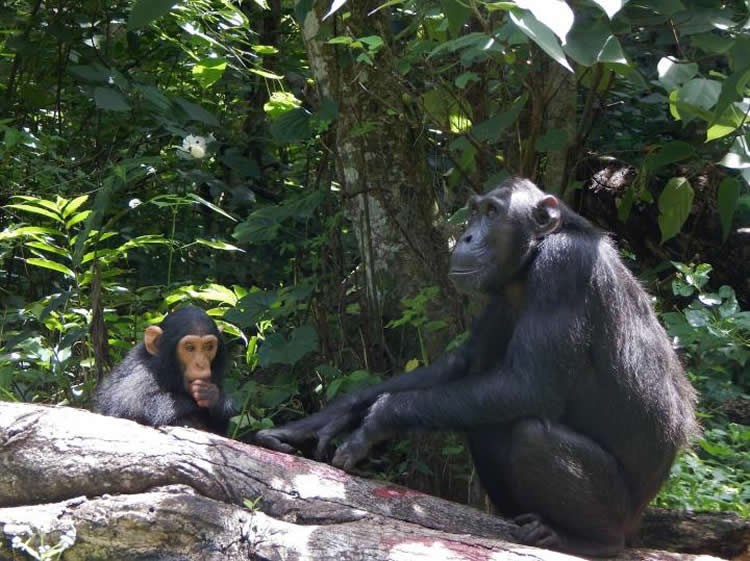Summary: A new study sheds light on infanticidal behavior in male chimps, and reveals females are highly sensitive to the relative risks posed to their offspring by different males.
Source: University of Kent.
Research carried out by the University of Kent sheds light on the infanticidal behaviour of chimpanzees (Pan troglodytes) and demonstrates that females are highly sensitive to the relative risks posed to their babies by different males.
Researchers from the Living Primates Research Group in its School of Anthropology and Conservation (SAC), and the School of Psychology and Neuroscience at the University of St Andrews, examined the behaviour of female chimpanzees in the Budongo Forest, Uganda, where chimpanzees (at least in the study community) are particularly prone to committing and suffering infanticide.
The study by Adriana Lowe and Dr Newton-Fisher (SAC) and Dr Catherine Hobaiter (St Andrews) was carried out during a period in which a mid-ranking male rose rapidly in rank.
Males can benefit from infanticide when they can kill an unrelated infant and replace it with one they have fathered. Because rank is linked to mating access in chimpanzees, a male who rises quickly in rank is surrounded by babies he is unlikely to have fathered, compared to any babies conceived after his rise.
This means a male who rises in rank is suddenly a threat to mothers and their babies.
Mothers, specifically those with younger, more vulnerable infants, reduced their association with the rank?rising male during the period of instability. The research team also found evidence that females preferred to associate with a male of stable high rank on the basis that such males could offer protection against infanticide.

PhD student, Adriana Lowe said: ‘Watching chimps killing infants is really shocking and although it’s pretty well reported, it’s not been entirely clear why they do it. The mothers’ behaviour in our study supports the hypothesis that it’s a strategy by the males to get more mating opportunities. Male chimps are often described as great politicians as they use complex alliances to compete for high rank but this shows that the females are just as tuned in to the social environment, watching the males from the side-lines, sensitive to any changes which might put their babies in danger.’
The research builds on pioneering observations of infanticide in this community by Dr Nicholas Newton-Fisher more than 20 years ago (Infant killers of Budongo, 1999)The paper, titled, Countering infanticide: Chimpanzee mothers are sensitive to the relative risks posed by males on differing rank trajectories has been published in the American Journal of Physical Anthropology.
Source: Sandy Fleming – University of Kent
Publisher: Organized by NeuroscienceNews.com.
Image Source: NeuroscienceNews.com image is credited to Adriana Lowe, School of Anthropology and Conservation, University of Kent.
Original Research: Abstract for “Countering infanticide: Chimpanzee mothers are sensitive to the relative risks posed by males on differing rank trajectories” by Adriana E. Lowe, Catherine Hobaiter, and Nicholas E. Newton‐Fisher in American Journal of Physical Anthropology. Published October 10 2018.
doi:10.1002/ajpa.23723
[cbtabs][cbtab title=”MLA”]University of Kent”Female Chimps Know Which Males Are More Likely to Kill Their Babies.” NeuroscienceNews. NeuroscienceNews, 18 October 2018.
<https://neurosciencenews.com/chimp-female-male-babies-kill-10053/>.[/cbtab][cbtab title=”APA”]University of Kent(2018, October 18). Female Chimps Know Which Males Are More Likely to Kill Their Babies. NeuroscienceNews. Retrieved October 18, 2018 from https://neurosciencenews.com/chimp-female-male-babies-kill-10053/[/cbtab][cbtab title=”Chicago”]University of Kent”Female Chimps Know Which Males Are More Likely to Kill Their Babies.” https://neurosciencenews.com/chimp-female-male-babies-kill-10053/ (accessed October 18, 2018).[/cbtab][/cbtabs]
Abstract
Countering infanticide: Chimpanzee mothers are sensitive to the relative risks posed by males on differing rank trajectories
Infanticide by males is common in mammals. According to the sexual selection hypothesis, the risk is inversely related to infant age because the older the infant, the less infanticide can shorten lactational amenorrhea; risk is also predicted to increase when an infanticidal male’s chance of siring the replacement infant is high. Infanticide occurs in chimpanzees (Pan troglodytes), a species in which male dominance rank predicts paternity skew. Infanticidal male chimpanzees (if low‐ranking) are unlikely to kill their own offspring, whereas those who are currently rising in rank, particularly when this rise is dramatic, have an increased likelihood of fathering potential future infants relative to any existing ones. Given that mothers should behave in ways that reduce infanticide risk, we predicted that female chimpanzees, and specifically those with younger, more vulnerable infants, would attempt to adjust the exposure of their infants to potentially infanticidal males. Specifically, mothers of young infants should reduce their association with adult males in general, and to a greater extent, with both low‐ranking males and those rising in rank from a position where paternity of current infants was unlikely, to a rank where the probability of siring the next infant is significantly higher. We also investigated the alternative possibility that rather than avoiding all adult males, mothers would increase association with males of stable high rank on the basis that such males could offer protection against infanticide.
Materials and methods
We examined data on female association patterns collected from the Budongo Forest, Uganda, during a period encompassing both relative stability in the male hierarchy and a period of instability with a mid‐ranking male rising rapidly in rank.
Results
Using linear mixed models, we found that mothers reduced their association with the rank‐rising male, contingent on infant age, during the period of instability. We also found evidence that females preferentially associated with a potential protector male during the high‐risk period.
Discussion
Our results support the sexually selected hypothesis for infanticide and demonstrate that female chimpanzees are sensitive to the relative risks posed by adult males.






